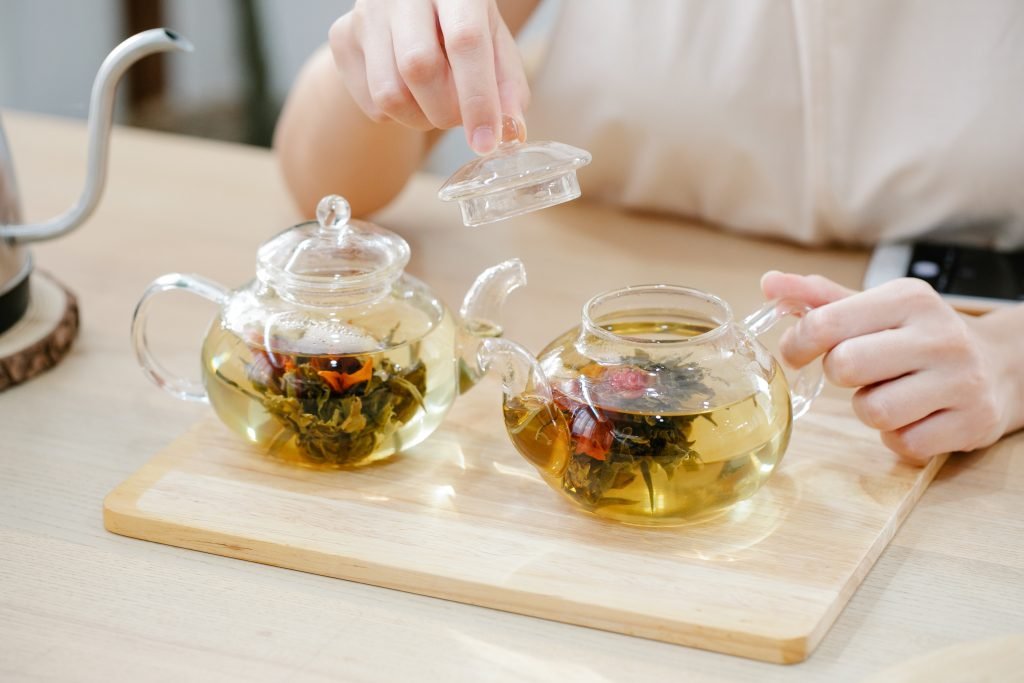Depending on the type of leaf, it is necessary to determine the temperature the water should have in order to obtain the best flavor.
The temperature of the water is an important factor that directly affects the flavor of the tea infusion. When it is too low, the palatable elements of tea cannot dissolve properly. Nor are the fragrant substances responsible for the aroma fully released.
Conversely, when the temperature is too high, the tea infusion can have a higher concentration of astringent and bitter substances, such as tannins and caffeine, which often mask the more subtle aromas. This is especially so when dealing with tender shoots or small-sized leaves.
On the other hand, catechins and flavonoids, antioxidant compounds present mainly in white, green, and blue tea, are sensitive to heat, so too intense exposure to heat can weaken or even neutralize them.
Therefore, the fundamental criterion is to decide the temperature of the water according to the tenderness of the tea leaves. Thus, teas with small and tender leaves are infused with water at low temperatures, while tea with thick buds and harder leaves is preferable to be infused with boiling water.
As a general rule, we prepare green teas with small and tender leaves between 50 and 70ºC (122 and 158°F); white and green teas with thick buds and large leaves up to 80ºC (176°F); yellow teas at 90ºC (194°F) and black, oolong (blue) and post-fermented (red) teas, between 95 and 100ºC (203 and 212°F).
Even so, there are many exceptions and it is advisable to follow the indications of our trusted tea supplier. Until the necessary practice is acquired, it is very useful to use a thermometer and a watch, since temperature and infusion time are important variables closely related.

How Does Water Temperature Affect Tea Flavor?
Water temperature is an important factor that determines the flavor of tea. Depending on the type of tea, the ideal temperature can vary. For example, black teas are usually brewed with water at or near boiling point, while green and white teas are often brewed with water at a lower temperature, typically around 70°C to 80°C or 160°F to 180°F.
When water is heated, its molecules become more active and move faster, which causes the water to expand and its density to decrease. This decrease in density causes the water to rise, creating convection currents that mix the water and distribute heat evenly.
When tea is brewed in water, the active molecules in the water help to extract the flavor and other compounds from the tea leaves. However, if the water is too hot, it can cause the tea to become bitter or astringent, as the high temperature can break down certain compounds in the tea, such as catechins and tannins, which can make the tea taste harsh.
For example, black teas typically require water at or near boiling point, around 100°C (212°F), as the high temperature helps to extract the full flavor and aroma of the tea. Green teas, on the other hand, are best brewed at a lower temperature, typically around 70°C to 80°C (160°F to 180°F), as the lower temperature helps to preserve the delicate flavor and aroma of the tea.
How Does Water Temperature Affect Tea Brewing Time?
Water temperature plays a critical role in tea brewing, and it can significantly affect the brewing time required to produce a perfect cup of tea.
Different teas require different temperatures for optimal flavor and aroma. For instance, green tea and white tea typically require a lower water temperature, around 70-80°C (158-176°F), while black tea and herbal tea require a higher water temperature, around 95-100°C (203-212°F).
The temperature of the water affects the rate at which the tea leaves release their flavors, aroma, and nutrients. If the water is too hot, it can over-extract the tea, leading to a bitter and astringent taste. If the water is too cold, it won’t extract sufficient flavor, providing a tasteless and weak brew.
The optimal brewing time also varies depending on the type of tea and the water temperature used. Generally, the hotter the water, the shorter the brewing time required, while the cooler the water, the longer the brewing time.
Therefore, to brew a perfect cup of tea, it is essential to use the appropriate water temperature for the type of tea you are brewing and adjust the brewing time accordingly.
The ideal brewing time for tea can vary depending on the type of tea and the water temperature. Here are some general guidelines for brewing tea based on water temperature:
Black Tea:
- Water temperature: 95-100°C (203-212°F)
- Brew time: 3-5 minutes
Green Tea:
- Water temperature: 70-80°C (158-176°F)
- Brew time: 1-3 minutes
White Tea:
- Water temperature: 70-80°C (158-176°F)
- Brew time: 1-3 minutes
Oolong Tea:
- Water temperature: 80-90°C (176-194°F)
- Brew time: 3-5 minutes
Herbal Tea:
- Water temperature: 95-100°C (203-212°F)
- Brew time: 5-7 minutes
Keep in mind that these are general guidelines and the ideal brewing time can vary based on personal preference. It’s also important to use fresh, high-quality tea leaves and to not over brew the tea to avoid bitterness.

Final Word
In conclusion, the water temperature is a crucial factor in tea brewing that significantly affects the flavor and brewing time. The optimal water temperature varies depending on the type of tea, with green and white teas requiring lower temperatures than black and herbal teas.
The water temperature affects the rate at which the tea leaves release their flavors, aroma, and nutrients, and using the wrong temperature can result in a weak or bitter brew. Therefore, it is crucial to use the appropriate water temperature for the type of tea being brewed to produce a perfect cup of tea with optimal flavor and aroma.


